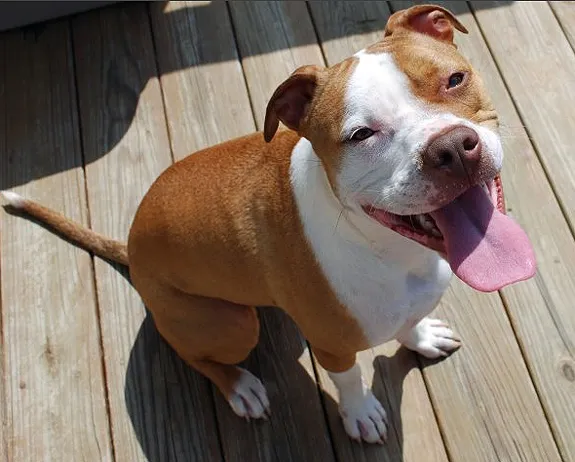by Michael Mountain
Founder, Best Friends Animal Society and The Stubby Dog Project
When Wil Willis arrived for lunch at the home of his new friends, Jasmine and Cory Grimm, and they opened the front door, he shrank back in fear.
“I was greeted by the biggest Pit Bull I had ever seen in my life,” he said. “I thought to myself, ‘There’s no way I’m going into that house.’ ”
Seeing that their guest was nervous, Cory had his dog, Moose, sit down and get used to the visitor. Midway through lunch, Willis was feeding Moose tidbits and petting him.
Back at home that evening, Willis, an African American, was still going over what had happened at lunch. He realized he’d reacted to Moose in exactly the same way a police officer had reacted to him a few years earlier.
“I’d just moved to Newport Beach in California, and I was driving slowly in the right lane because I didn’t yet know my way around,” he said. In the lane to the left, a Porsche and a Mercedes had just whipped by at around 80 mph. But in his rearview mirror Willis saw the lights of a police car and it was he, not the people in the speeding Porsche or the Mercedes, who was being pulled over. He was “driving suspiciously,” and when the officer saw his name, he was abruptly handcuffed and taken to the station. A few hours later, he was released. They had the wrong “Willis.”
“The police officer had pulled me over for no real reason,” Willis said. “He judged me on his impression of how I looked and what I was driving. He profiled me. And at lunch today, when I met Moose, I did the exact same thing. I took one look and saw he was a Pit Bull, and I said, ‘No thank you.’”
All about implicit associations
The police officer who stopped Willis might not have thought of himself as being prejudiced. Neither did Willis when he met Moose. But we all make what psychologists call implicit associations, and we make these snap judgments unconsciously in a fraction of a second.
“It’s now well established that these things happen automatically and influence people’s behavior without thinking,” said Tony Greenwald, professor of social psychology at the University of Washington. “Many of these associations are established early in life in relation to race, ethnicity, gender, and so on. So even if we’ve changed our explicit views (the ones we’re conscious of), we pick up these implicit associations within half a second or so of looking at a person.”
It’s the same when you look at a dog. “You pick up the breed association very rapidly if you’re at all familiar with the type of dog,” Greenwald said. “If you see a Pit Bull or something that looks like a Pit Bull, you’re going to have those associations triggered.”
The good news: nothing lasts forever
Dr. Lee Jussim, a professor at Rutgers University, has some optimistic news for those who have Pit Bulls and are looking for ways to diminish and ultimately dismantle the prejudice they have to contend with.
His studies show that when you get to know a particular person – and Jussim sees no reason why this wouldn’t apply to a dog, too – you tend to base your assessment of them not on any generalized stereotype, but on the real-time information you have about that individual.
And that’s good news for people with Pit Bulls who feel they’re up against a tidal wave of discrimination that’s impossible to undo.
“There’s plenty of research that suggests that extended, positive contact with a person from a group to whom you harbor implicit prejudice can even reduce implicit prejudice toward that group,” Jussim said.
In other words, the more you can give someone a positive experience with a Pit Bull, even just briefly, the more of a dent you’re making in the overall stereotype.
“Stereotypes can change quite quickly,” Jussim said. “In the 1930s, Americans had a positive image of the Japanese as good, hard-working people – like the Puritan ethic they could identify with. After the bombing of Pearl Harbor, that changed immediately. Americans thought of the Japanese as being sneaky, sly and malevolent. After the war, the stereotype changed again: it became more about the Japanese being the manufacturers of cheap goods. After that, they were seen as a strong ally but also a commercial threat. Overall, as relationships between groups change, so do the stereotypes.”
Greenwald agrees that stereotypes can change quite dramatically. He cited the example of how American attitudes toward Arabs, and Muslims in general, transformed in the wake of 9/11.
As regards Pit Bulls, we already know that the stereotype has undergone several transformations – most recently from “America’s family pet” in the 1940s and 50s to how they’re perceived today.
There are numerous stories that draw positive associations with Pit Bulls as heroes, therapy dogs, prize-winning athletes and more. “If Pit Bulls were to become the dog of choice for fire departments [or similar],” Jussim said, “that would almost certainly produce a change in people’s views of them.”
Meet a Pit Bull
The most impactful way to affect people’s implicit, unconscious attitudes toward any particular group of dogs or other humans is to give them a positive personal experience.
“People need to see kind, gentle, fun-loving Pit Bulls,” Jussim said. “That can make a big difference.”
That doesn’t mean that a single positive experience with one dog is going to undo years of fear about an entire population. But it all works toward correcting misperceptions and overcoming discrimination.
This article first appeared here on zoenature.org.
Michael Mountain is one of the founders of Best Friends Animal Society, the nation’s largest animal sanctuary and one of the pioneers of the no-kill movement for homeless pets. As president of Best Friends and editor of Best Friends magazine, he helped to build grassroots adoption and spay/neuter programs all over the country before stepping down in 2008. He currently is the editor and co-founder of Zoe— a new online magazine for people who care about animals, nature and the environment — and the co-founder of StubbyDog, which is working to change public perceptions of Pit Bulls.










